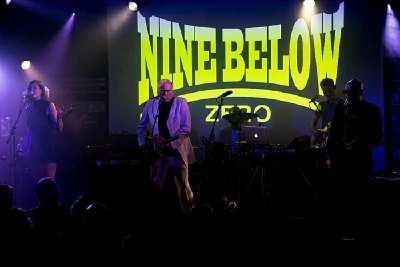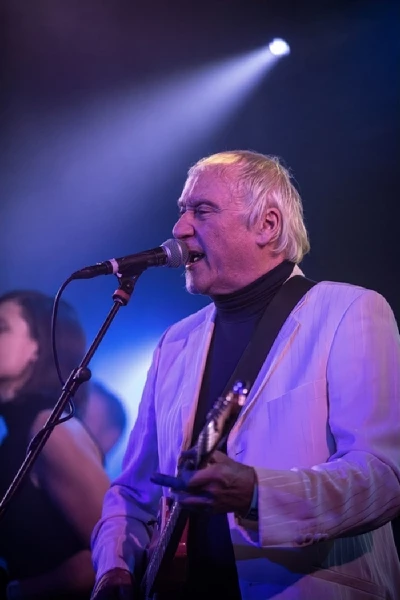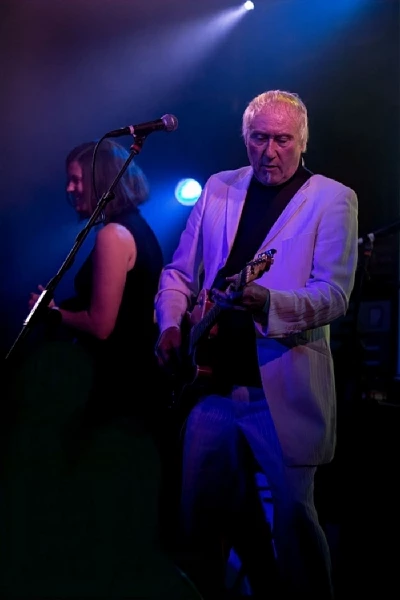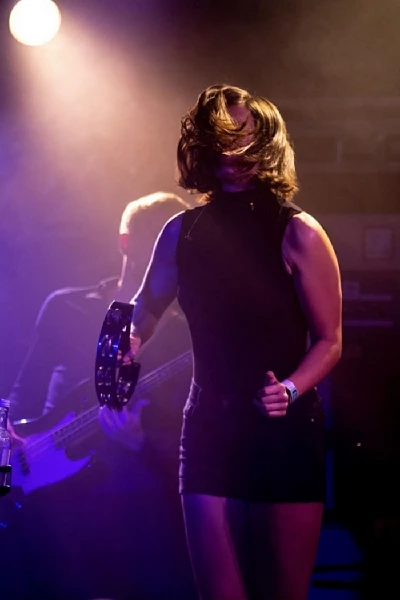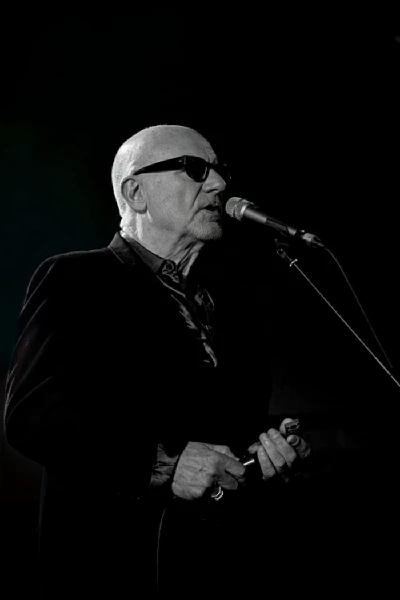published: 24 /
12 /
2019
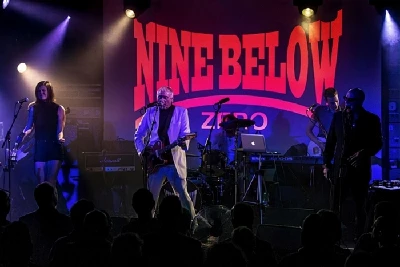
Vocalist and guitarist Dennis Greaves from South London blues rock band Nine Below Zero talks to John Clarkson about their 40th Anniversary this year and new album, 'Avalanche'.
Article
"You have got to write new material," says Nine Below Zero's vocalist, lead guitarist and main songwriter Dennis Greaves. "It would be easy to go around playing exactly the same songs that I wrote back in the early 80s, but I didn’t want that. Every two or three years I make a new album, so there is something new for the fans, something new for us. I. The energy and the passion is still here. As soon as that stops, that is when we stop."
He is talking to Pennyblackmusic about Nine Below Zero's 40th Anniversary this year and its new album, 'Avalanche', which he declares to us is "the best" it has ever recorded.
One of the leading blues rock bands in the UK, Nine Below Zero have in an extraordinary career released over twenty studio and live albums, toured with the Who, the Kinks and the Stranglers and infamously appeared in the first episode in the first series of 'The Young Ones' as the house band.
'Avalanche', which was produced by award-winning blues drummer and producer Wayne Proctor, has been dubbed by Greaves as having been recorded by 'the big band'. As well as featuring long-term members Mark Feltham (harmonica and vocals) and Ben Willis (bass), 'Avalanche' also includes Stone Foundation's Dave Boraston on trumpet and three young musicians, Greaves' son Sonny on drums, keyboardist Tom Monks and female vocalist Charlie Austen.
Its tracks include the blistering opener 'I Wanna Be a Wanna Be’ and the thunderous Dr Feelgood-reminiscent 'Breadhead'. Austen takes the lead on two tracks, the breezy 'Ter Wit Ter Woo' and the heartbreaking 'Recycle Me'.
Pennyblackmusic spoke to Dennis Greaves on a day off in a three month tour which will find Nine Below Zero playing shows across the UK every weekend up until mid-December.
PB: ‘Avalanche’ was a difficult album to album to make. Three of the musicians that you originally were scheduled to go into the studio with left the group directly before the recording,
DG: I started this record about two years ago. I keep ideas in my phone on the voice recorder. I use pen and paper a lot too and I scribble bits and bobs everywhere, plus at the back of my mind there are always ideas. Once you open all that up you unlock the box, and it all comes out. You have, however, got to get it right. I thought that I had got it right. I had opened up the box. I had started to write the songs. I had started to think about studios, and then my drummer, who runs his own business and couldn’t mix the two anymore, left, and then the keyboardist and the trumpet player shortly afterwards left too. All my plans were totally up in the air, but the funny thing is in hindsight I don’t think it would have been as good with those guys involved.
We got in on drums my son Sonny, and then Dave Boraston who is with Stone Foundation came in on trumpet, and a young guy called Tom Monks, who comes and jams with us, played the keyboards. I run a blues jam in South London on the last Sunday of every month. I had had my eye on Tom, who is a regular there and reminds me of John Mayall, for a while. He can play anything – keyboards, harmonica, bass, drums.
It was a big risk putting two young guys in there who had never recorded an album before, but what they brought to the album was a fearlessness. They were fearless and they expressed themselves really well. I think that is why there is such an energy on ‘Avalanche’. I see Sonny and Tom as being like perfect midfields in a football team. You have got the experience and the youth, the youth running around and picking up the ball and winning it back and then passing it onto the more experienced players to distribute it. It worked like that with them in the studio.
Sonny has also grown up in a house surrounded by the music business. He has grown into it. When he and my other son were one and two, they were running around the Albert Hall while I was soundchecking. They were born into it. It is in their DNA.
PB: You apparently felt somewhat dubious about employing him initially . Was that just because you didn’t want to be seen as being nepotistic?
DG: Exactly. I didn’t want to be accused of that but now that he is on the tour everyone realises it is on talent alone that I employed him. I made that decision on that, and not on the fact that he was my son.
PB: You have also got now a girl singer in the band, Charlie Austen. Who is she?
DG: Charlie is just amazing. She walked into my blues jam two and a half years ago, and came up to me very shyly and said, “Can I sing ‘Stormy Monday?’” I said, “Yeah. What key?” She said, “B Flat,” and she opened her mouth and the whole place just stood still in absolutely riveted silence watching her. The next day I got her down the studio, and so she is on ‘13 Shades of Blue’, our previous record, which is a covers album in which we recorded our favourite covers from across the blues spectrum. She did ‘Don’t Play That Song for Me’ by Aretha Franklin. She is a good songwriter as well.
We sing in unison on ‘Race to the Bottom’ and do a duet on ‘One of Sour, Two to Sweet’, We are very lucky in our voices match. You know if you are going to be able to write songs with someone in the first twenty seconds and you know immediately if the chemistry is right. She also sings the lead on two other tracks on the album, ‘Ter Wit Ter Woo’ and ‘Recycle Me’.
PB: It is a more orchestral album in sound than the previous Nine Below Zero records and involves what you call 'the Big Band'. How easy or difficult was it creating the arrangements for this record?
DG: After the drummer, the keyboard player and the trumpet player all left, I put together a six piece version of the band, Charlie, Sonny, Tom, Mark Feltham on harmonica, Ben Willis on bass and myself, and we went into a rehearsal studio in Dartford for three days, and I knew in the first hour that it was going to work. Some things just fall into place and some things take days trying to fit a square peg into a round hole, but this all just fell into place.
We were going to record the album with Wayne Proctor up in Nottingham, but I decided instead to record the album at Glenn Tilbrook’s studio 45 RPM in Charlton where we have recorded several of our other albums. It was like coming home really because I can walk there from my house.
We then got Wayne back in to mix it. Wayne had never really been involved in mixing before and maybe I shouldn’t have got him involved in doing so, but I trusted him. It was like giving your children to a babysitter for the first time. The first mix he did was for ‘Ter Wit Ter Woo’, and it was superb. You might have three or four guitar parts in there and then when it comes to mixing you love them all and so you put them all in, but it not really for the benefit of the track. So, you need someone from outside to say, “That doesn’t need to be there,” and to make the decisions that you might not be able to make and if it is not working or making anything better or stronger to get rid of it. Wayne did an amazing job on it.
PB: Was ‘I Wanna Be a Wanna Be’ directed at anyone in particular?
DG: Yeah, my son was in a band a couple of years ago and they were absolutely useless. They were one of these many bands that kept playing in Camden and they were rubbish. They weren’t worried about the right things, like the guitar sound or the intuition of the chords. They just wanted to be rock stars.
It was also about all the reality TV that I was watching on the telly at the time, and social media and the self-importance of people. When I was writing the song, I thought, “Blimey! A little bit of this reminds me of me when I was younger,” so the last verse is pretty self-deprecating (Laughs). I was having a go at all these wannabe stars, but when I thought back to when I started there was a little bit of me in there too.
PB: What about ‘Breadhead’? What inspired that one?
DG: It was about a couple of musicians who I have met over the years who were just in it for the money. It is something that i have never been into. For example, when I was looking for record company contracts years and years ago I was very happy with one guy at one label, and then someone came along and offered us another £40,000 to sign us and I just thought, “No. I really like this guy and I will be able to work well with him. He would be good for me.” So, I have never done anything just for the money, but I have met a couple of people who are just total breadheads. I am not saying they have not been successful. They are people who seem to have made a success of it. I am not saying that I am better than them either. I just feel like I can sleep better at night.
PB: ‘Recycle Me’’ is about a dying girl who gave her organs up for transplant. It is both a song which is sad and yet full of hope.
DG: Yes, she was thirteen and all that she was worried about was other people benefiting from her loss of life. I couldn’t believe it when I read about her that she wasn’t thinking of herself, but she was thinking of others. She was so brave and so thoughtful of others. All that was in her mind was that she could leave as much as she could so that other people could live on.
PB: Nine Below Zero is celebrating its 40th Anniversary this year. Why do you think it has proved so long-lasting?
DG: Probably because I am stubborn (Laughs). There is still lots I want to do. There is still lots I want to achieve. The proof of that is that I think I have just made the best album that I have ever made. As a songwriter you are always improving, and you tinker and tweak but you never really arrive. It is a journey where we still have a bit of mileage left.
PB: Your current tour is taking a slightly unusual direction as you are playing most weekends between now and Christmas, but are avoiding week dates. Why have you done that instead of doing one big three week tour?
DG: I feel that I can perform really well over three nights. It is such an energetic show. There are also some venues that you can’t book during the week. Some venues just won’t open during the week. It is like some pubs don’t open on Mondays or Tuesdays. I have also got more chance of getting people out on a Friday or Saturday night than a Tuesday night.
PB: Final question. What are your plans after that for next year?
DG: We will be continuing to tour this album. We have got things coming up in Italy, Germany and France. I think that we will be touring for eighteen months on and off with this album, and by then I hope we will have enough material to start recording the next one.
PB: Thank you.
Photos by Andrew Twambley
www.twambley.com
Band Links:-
https://www.facebook.com/ninebelowzero
http://www.ninebelowzero.com/
https://www.instagram.com/ninebelowzer
https://twitter.com/ninebelowzero1
https://www.youtube.com/channel/UCkCAk
Picture Gallery:-
